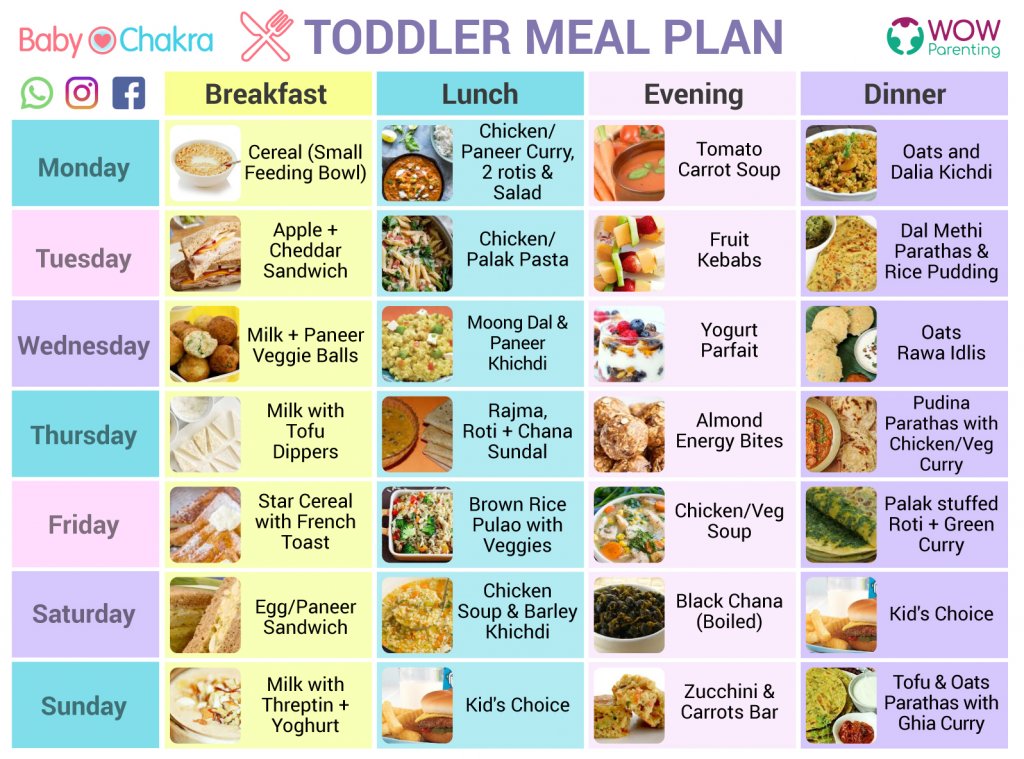The ideal balanced diet for toddlers

At toddlerhood, the nutritional requirement increases as your child is growing. Food needs to be balanced and a lot of planning should be involved as at this age, their stomach fills up easily and they like variety in food. When your child turns 1, you can start offering most food items consumed at home except for spicy, very salty and deep fried food. Sticking to a 3 meal option is not recommended as the child’s stomach fills up easily. A better idea is to offer 5 to 6 smaller meals with smaller portion sizes.
A toddler diet plan could get tedious as they generally tend to get bored with the same food items and look for variety. But, it is an important task as it is vital to meet their body’s nutritional requirements and to make them physically and mentally strong.

Given below is a list of the most important food groups and food options that need to be included in a toddler diet plan:
Cereals – wheat, oats, rawa, ragi, rice. They are light on the stomach and are easy to digest. If the child finds it difficult to chew then it could be mashed or made a little soggy.
Milk and milk products – milk, cheese, curd, buttermilk, paneer. In milk, cow’s milk is the best for easy digestion. If you wish you to introduce your child to buffalo milk, do wait for a few months. Cheese is a great snack option and kids usually relish it.
Dals and pulses – It is recommended to start with pulses which are easy to digest like moong dal. Moong dal khichadi with ghee (clarified butter) is a very tasty and healthy option. Once your baby is used to moong dal, slowly progress to other pulses. Pulses should always be a little diluted while served to your baby. If you see any changes in their stool or any discomfort, stop giving it for a few days and then reintroduce.
Eggs and meat – eggs, chicken, and fish (should be given after 1.5 years to avoid allergies). It is a great idea to introduce your child to non-vegetarian food items like eggs and chicken for the protein content to be met. But, it is suggested to start with fish a little later than 2.5 years as there could be a possibility of your child to have indigestion and maybe allergic reactions too.
Fruits – apple, papaya, banana, chikoo, oranges, grapes, watermelon, muskmelon, pomegranate, seasonal fruits. They can be given to the child in any form like juices, mashed fruits or you could just chop them into small pieces. A fruit salad with a small scoop of ice cream is also a great way to tantalize your toddler’s taste buds.
Vegetables – spinach, beetroot, carrot, potato, tomato, cabbage, cauliflower, seasonal vegetables. Again, like fruits, vegetables too can be offered in any form to your toddler. You could make a salad, boil them or chop them into juliennes, toss it with pasta which children usually like, make different types of parathas or you could just go with the regular roti sabzi option.
You need to try and test a lot of options when it comes to maintaining a healthy diet for toddlers. Always keep in mind that you need to keep feeding your toddler every 2 to 3 hours. Kids do not find it very easy to express their need for food. So, it is best to keep offering small meals to them at regular intervals. It is proven that a well-fed child is more satiated and cheerful. Kids tend to become irritable and cranky if they are underfed. Do not worry about the quantity that they consume during each meal. Even a few spoons of food should keep their hunger at bay for a few hours and will provide the required nutrition when the child eats at regular intervals.




